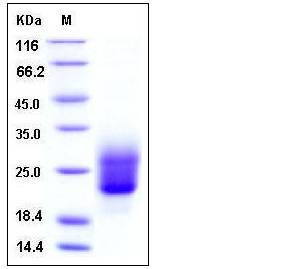Human NCR3 / NKp300 Protein (His Tag)
1C7,CD337,DAAP-90L16.3,LY117,MALS,NCR3,NKp30
- 100ug (NPP2362) Please inquiry
| Catalog Number | P10480-H08H |
|---|---|
| Organism Species | Human |
| Host | Human Cells |
| Synonyms | 1C7,CD337,DAAP-90L16.3,LY117,MALS,NCR3,NKp30 |
| Molecular Weight | The recombinant human NCR3 consists of 128 amino acids after removal of the signal peptide and has a predicted molecular mass of 14.4 kDa. In SDS-PAGE under reducing conditions, the apparent molecular mass of rh NCR3 is approximately 22-28 kDa due to glycosylation. |
| predicted N | Leu 19 |
| SDS-PAGE |  |
| Purity | > 97 % as determined by SDS-PAGE |
| Protein Construction | A DNA sequence encoding the extracellular domain (Met 1-Gly 135) of human NCR3 (NP_667341.1) precursor was fused with a polyhistidine tag at the C-terminus. |
| Bio-activity | |
| Research Area | Immunology |Innate Immunity |Natural Killer Cell (NK Cell) |
| Formulation | Lyophilized from sterile PBS, pH 7.4 1. Normally 5 % - 8 % trehalose, mannitol and 0.01% Tween80 are added as protectants before lyophilization. Specific concentrations are included in the hardcopy of COA. |
| Background | Natural Cytotoxicity Triggering Receptor 3, NCR3, also known as NKp30, or CD337, is a natural cytotoxicity receptor, expressed on subsets of human peripheral blood NK cells, involved in NK cell killing of tumor cells and immature dendritic cells. The cellular ligand for NKp30 has remained elusive, but the membrane-associated heparan sulfate (HS) proteoglycans are involved in the recognition of cellular targets by NKp30 was recently reported. NKp30 is a member of the immunoglobulin superfamily and one of three existing natural cytotoxicity-triggering receptors. NKp30 is a glycosylated protein and is thought to be selectively expressed in resting and activated natural killer cells. NKp30 is a stimulatory receptor on human NK cells implicated in tumor immunity, and is capable of promoting or terminating dendritic cell maturation. NCR3 may play a role in inflammatory and infectious diseases. |
| Reference |
